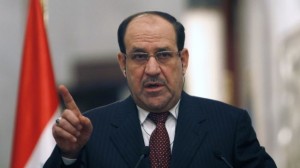By: David P. Griscom
Failing to procure a working government, Baghdad has slipped even further into disarray as current Prime Minister Nouri al-Maliki postured himself as the protector of the constitution, rejecting the appointment of Haider al-Abadi by President Fuad Masum.
Haider al-Abadi lived in exile during the Saddam Hussein regime and like Nouri al-Maliki is member of the Dawa party. Membership in the Dawa party was illegal under Saddam Hussein’s rule and many members spent those years in exile. Al-Abadi has expressed support for Iranian aid in the current crisis in a Washington Post interview, stating “If US air strikes [happen], we don’t need Iranian air strikes. If they don’t, then we may need Iranian strikes.” Al-Abadi has a reputation as a determined leader and skilled diplomat.
While Maliki has been losing support in the Middle East, the United States has already positioned themselves against Maliki as Obama refused military support until Maliki stepped down back in June. The relationship between Maliki and Iran has also troubled US officials who find the influence of Iran in the area to be menacing. As the United States has become less involved in Iraq during the past three years, Iran has become a crucial player in Iraq’s domestic affairs. While Maliki has benefited from his relationship with Iran in the past, Iranian Major General Qasem Solemani’s suggestion that Maliki should step down represented a cooling of this relationship. Most importantly, Iran’s statement of support for Haider al-Abadi extinguishes the last bit of hope of international support for Maliki.
It is commonly thought that it was Maliki’s favoritism of his own Shi’ite people as being one of the most influential factors in alienating the citizens of Iraq who have joined ISIS. This group aspires to create a new Islamic caliphate continues to grow and to conquer more territory in Iraq as the political situation in Baghdad worsens.
Maliki, who appeared to make military threats on Monday, has calmed his language claiming that the military should be more focused on combatting the encroachment of ISIS rather than playing politics. Maliki may still believe himself to be the rightful ruler of the military and the state, a New York Times report claims that key Iraqi military officials have stated that they would not support Maliki against the Iraqi government of al-Abadi.
According to the Wall Street Journal, Maliki has filed a formal case against Fuad Masum, claiming that his party should be allowed to choose the Prime Minster. In the meantime, Maliki is still the Prime Minister while al-Abadi has the challenge of forming a new government in an uncooperative Baghdad.
There has also been mobilization of troops loyal to Maliki in the Green Zone of Baghdad. While the attitude in the United States is that Maliki is pandering to retain control of a state that he has lost, he still has support in Baghdad with many people participating in pro-Maliki demonstrations the past few days.
Maliki will likely continue a legal challenge to the appointment of Al-Abadi, but with the pressure of the international community against him, especially Iran, Maliki is unlikely to be able to hold the position of Prime Minister. Even though he may have a few small groups loyal to him in the military, the direness of the situation in Northern Iraq and the uncooperative nature of the international community will make any prolonged challenge difficult and likely unsuccessful.
As this crisis continues to unfold, one thing can be certain: Iran is proving itself to be one of the most, if not the most, critical power in the Middle East. At least in terms of Iraq and Syria, the world may be looking to Tehran rather than Washington to play kingmaker.
Image credit Presstv.com

